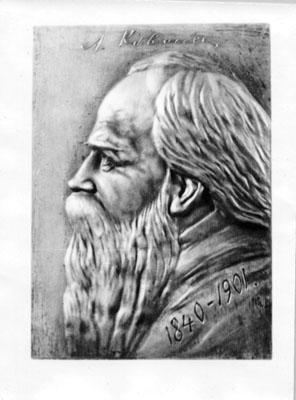Main >> Society activity >> Academic prizes >>The Kowalevsky Medal
International Prize of
St. Petersburg Society of Naturalists
The Kowalevsky Medal
The St. Petersburg Society of Naturalists is pleased to announce the re-establishment of the Alexander Kowalevsky Prize for contributions in the fields of evolutionary developmental biology and comparative zoology.
ALEXANDER KOWALEVSKY (1840 ¢ 1901)
 Alexander
Kowalevsky studied zoology in St. Petersburg and Heidelberg,
and later taught as a professor in Kazan, Kiev, Odessa
and finally in St. Petersburg University. At the end
of his life he was a full member of the St. Petersburg
Academy of Sciences and the director of its Zoological
Laboratory at which he worked with his students, among
them embryologist Constantin Davydoff and immunologist
Sergei Metalnikoff. His main field research on the development
of marine animals was done at the Naples Zoological Research
Station and at various other sites in the Mediterranean,
the Red Sea and the Black Sea, where he organized the
Sevastopol Biological Station.
Alexander
Kowalevsky studied zoology in St. Petersburg and Heidelberg,
and later taught as a professor in Kazan, Kiev, Odessa
and finally in St. Petersburg University. At the end
of his life he was a full member of the St. Petersburg
Academy of Sciences and the director of its Zoological
Laboratory at which he worked with his students, among
them embryologist Constantin Davydoff and immunologist
Sergei Metalnikoff. His main field research on the development
of marine animals was done at the Naples Zoological Research
Station and at various other sites in the Mediterranean,
the Red Sea and the Black Sea, where he organized the
Sevastopol Biological Station.
As one of the founders of modern comparative and evolutionary embryology Kowalevsky has left everlasting legacy and secured an honorable place in the history of science. He invented and implemented in his research the method of cell-lineage in embryology ¢ the name of its creator unfortunately is less known than the method itself. His classic works on the embryology of lancelet (Cephalochordata) and sea squirts (Tunicata) as well his other research on embryology of ælower wormsÆ and annelids, brachiopods and many other animals greatly contributed to our vision of relations between different branches of Metazoan kingdom. Following his dictum "In specialibus generalia quaerimus" (We seek the general in the specifics.") Kowalevsky attempted to demonstrate the general rules of Metazoan development through the most detailed analyses of embryonic and larval anatomy, and he laid the foundations for understanding evolutionary relationships among diverse animal phyla.
![]()
THE KOWALEVSKY MEDAL
In 1910, the St. Petersburg Society of Naturalists had established an international award in commemoration of Alexander Kowalevsky and his legacy. The award included a modest sum of 250 gold rubles and a bronze medal with Kowalevsky's profile designed by Petr Stadnitsky.
According to its statute, the award was to be given for original works in the morphology (comparative anatomy) and embryology of invertebrates. Unfortunately the inauguration of this project was interrupted by the First World War followed by the Russian Revolution and the Civil War, which undercut the traditional international ties of St. Petersburg Society of Naturalists.
Luckily the original medal was saved in the Hermitage collections and in the State Mint, where it was first produced in the 1910s and where even the original casting mold was preserved. The St. Petersburg Society of Naturalists recently discovered the existence of the original casting mold and decided to reinstate the international award with the original medal designed over 90 years ago. The recent decision of the Society established international award "Alexander Kowalevsky's Medal" which would include a diploma and a bronze medal in its original form.
The Kowalevsky Medal will be awarded for extraordinary achievements in comparative zoology and embryology to the scientists who have contributed greatly to the modern understanding of evolutionary relations between major groups of animal kingdom, the evolutionary biology of development, and modern approaches in comparative zoology. This project of a new international award will be implemented by the Society in two stages.
First, by the end of the year 2001 the Society intends to award several medals to honor the most distinguished scientists of the twentieth century in the field of evolutionary embryology and comparative zoology research whose life and work spanned over many years of the century. The Society will select these most distinguished individuals based on the international nominations ¢ over twenty nominators from different countries and diverse set of institutions will ensure a broad range of names of nominated scientists. The final selection for the award will be based on a full list of names ranked according the number of nominations.
Second, from the year 2002 the Society intends to make this award an annual one, giving every year one medal to a scientist who has made outstanding contributions to the modern understanding of evolutionary relations between major groups of animal kingdom, evolutionary developmental biology and/or modern approaches in comparative zoology. Again, selection will be based on the international nominations.
![]()